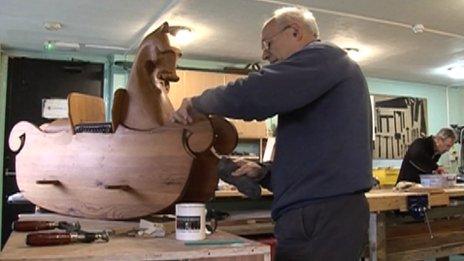Lonely London: Poll suggests a quarter feel alone
- Published

More than a quarter of Londoners say they feel lonely often or all of the time, according to a poll commissioned by BBC London.
The same proportion said there was little or no sense of community where they live and a third said they felt they did not know their neighbours.
But the majority, 93%, said they had someone in London they could turn to in a crisis.
Research company Populus interviewed 1,000 adults in London for the poll.
'Too isolated'
Twenty-seven per cent of respondents said that they felt lonely often or all of the time.
And 28% said there was little or no sense of community in their area of London, rising to 33% of those aged 65 or over.
Bernhard Luther, 72, from Archway, north London, said he found the city a friendlier place 20 years ago.
He said: "If you came as a stranger in a pub, automatically you would start talking but not any more. It's all too isolated.
"There was a nice community where I live but people move out.
"My friends are mainly dead or moved away so in this area it is now mainly young folk and they have their own way so it's quite different."
The Campaign to End Loneliness believes older people, like Mr Luther, are particularly affected by the high turnover and fast-changing nature of London.
Mr Luther combats his feeling of loneliness by visiting the Camden Town Shed twice a week.
It was set up last year by Mike Jenn who was inspired by the use of workshops in Australia to bring men over 60 together.
He said a high proportion of people find that when they retire they miss the companionship and purpose their work gave them.
"One of the things now said is the reason women live longer is because they communicate more. That makes the vast difference," Mr Jenn said.
"If you close down and shut yourself off you're signing your death warrant really."
'Empty place'
Thirty-three per cent of respondents to BBC London's poll said they did not know their neighbours well.
Those in inner London were more likely than those in outer London to say this, 38% compared with 29%.
Marjorie Wallace, of mental health charity Sane, said it was "not a big step to go from feeling persistently lonely to having clinical depression".
She said there was a danger of "social loneliness" where a person feels disconnected from their family, friends and community, combining with "emotional loneliness" where people "feel they are in a dark and empty place".
"That can have a huge impact on a person's physical and mental health."
Colette Downey, from Sutton, south London, a single mother with two daughters aged five and three, said she found it more difficult to recover from post-natal depression because of loneliness.
"My parents don't live in England. My father-in-law's very old, my mother-in-law's often ill," she said.
"A mum can't really help another mum. They have their own children.
"I was quite isolated. Being on my own I felt quite despairing and lonely."
Ms Downey found help through Home-Start, a charity which helps city families struggling to cope by making home visits and running family groups and social events.
"Home-Start has been the closest thing to family for me. They've let me believe in myself," she said.
Ms Wallace said these types of services, plus libraries and day centres, were essential.
"They are absolutely vital, they are as important as intensive care to people who are on the edge of that lonely cliff."
- Published9 July 2012
- Published10 February 2012
- Published10 February 2012
- Published28 February 2012
- Published6 December 2011
- Published10 September 2011
- Published1 February 2011
- Published25 May 2010
- Published8 December 2009
- Published1 December 2008